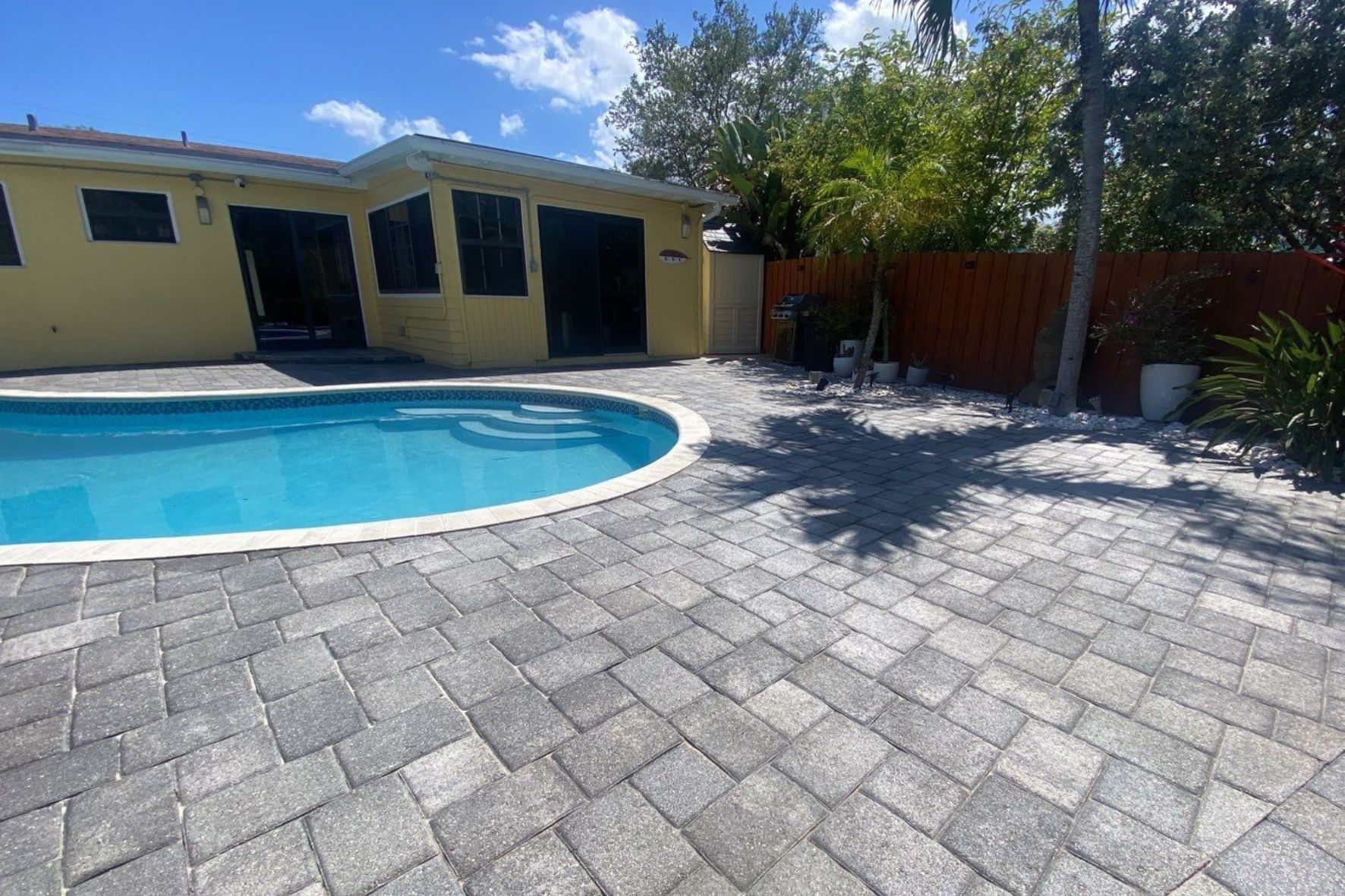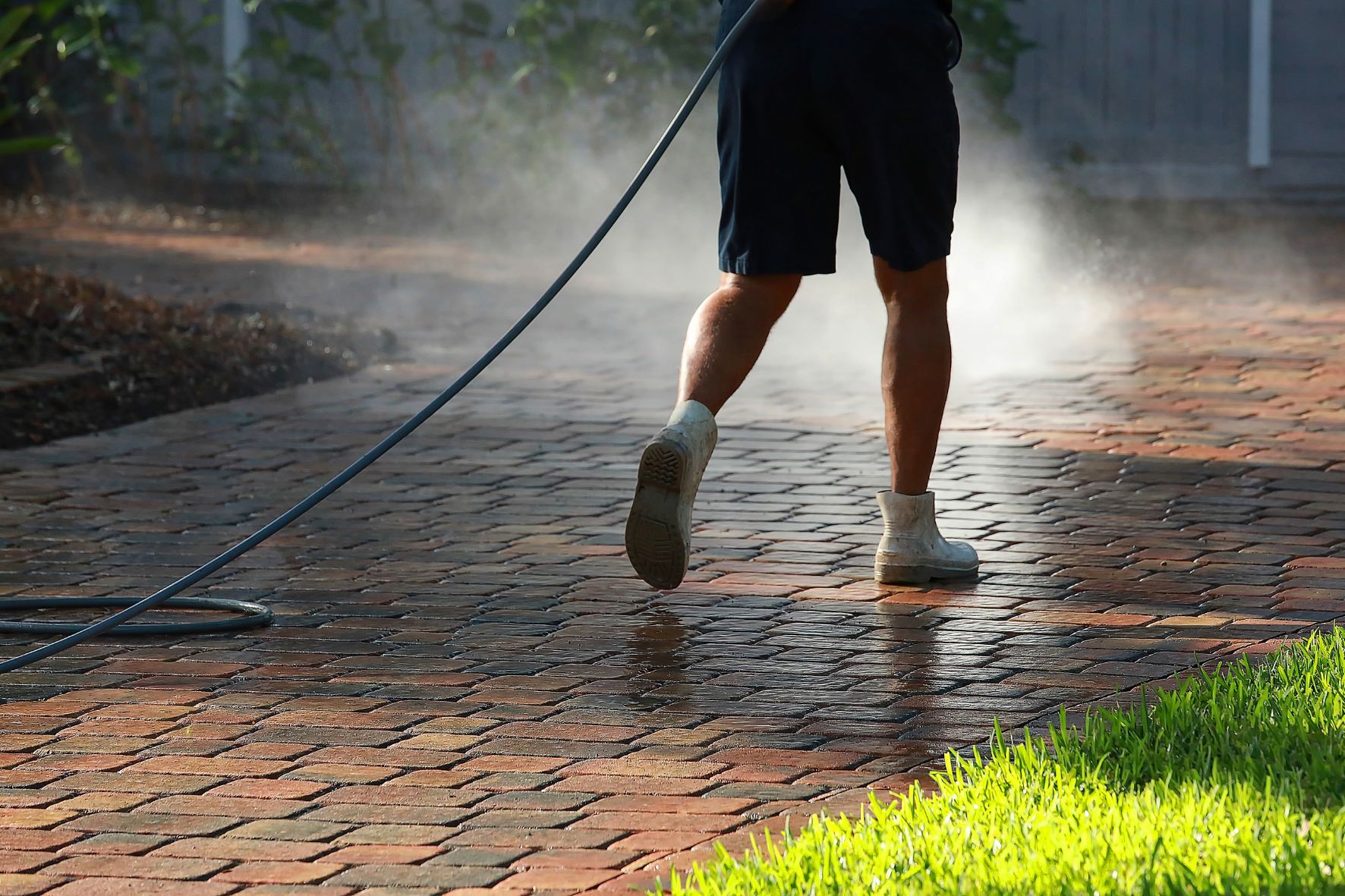Pavers are an excellent way to add a touch of sophistication and durability to any outdoor or indoor area. They provide a lasting solution for walkways, patios, driveways, and more. However, despite their strength and durability, pavers are not invincible. Without proper protection and maintenance, your pavers can quickly become worn and damaged.
Paver sealing not only helps to protect your pavers from the sun’s harsh rays and other weathering elements such as rain, snow, and ice, but it also enhances their color and adds a beautiful shine and texture to your outdoor space.
What is Paver Sealing?
Paver sealing is a process of applying a protective coating to brick, stone, or concrete pavers. The coating seals the pores of the pavers, creating an impervious barrier that prevents dirt, dust, and other contaminants from seeping in. It also locks the pavers together for a stronger bond and prevents weeds and moss from taking hold. Paver sealing helps protect against water damage, fading, and cracking caused by freeze-thaw cycles. Here are 5 key reasons to invest in Paver Sealing.
1. Prevents Staining and Fading
One of the primary benefits of paver sealing is its ability to prevent staining and fading. Pavers are exposed to various environmental elements, including dirt, dust, and pollutants, which can seep into the pores of the pavers and cause unsightly stains. By sealing your pavers, you create a protective barrier that prevents these contaminants from penetrating the surface.
Staining Prevention
Unsealed pavers are like sponges, readily absorbing any liquid or debris that comes into contact with them. This can include everything from spilled drinks and food to oil leaks from vehicles. Once these substances penetrate the paver’s surface, they can be difficult, if not impossible, to remove. Paver sealing provides a shield that repels these substances, making it much easier to clean spills and prevent permanent staining.
Fading Prevention
In addition to staining, pavers are also susceptible to fading due to prolonged exposure to the sun’s ultraviolet (UV) rays. UV rays can break down the pigments in the paver materials, causing them to lose their vibrant color over time. Paver sealants contain UV inhibitors that help block these harmful rays, preserving the color and appearance of your pavers. This not only maintains the aesthetic appeal of your outdoor space but also extends the life of your pavers.
2. Prevents Weeds and Moss
Another significant benefit of paver sealing is its ability to prevent the growth of weeds and moss. Weeds and moss can grow in the cracks and crevices between pavers, creating an unsightly and potentially damaging problem. Sealing your pavers helps to block the sunlight, moist air, and other nutrients that weeds and moss need to flourish.
Weed Prevention
Weeds are not only unsightly, but their roots can also cause significant damage to your pavers by displacing them and creating larger gaps. These gaps can allow more weeds to take root and further destabilize your paver installation. A quality paver sealant creates a protective barrier that helps to prevent weed seeds from germinating and taking root in the cracks between your pavers. This reduces the need for frequent weeding and helps maintain the integrity of your paver installation.
Moss Prevention
Moss thrives in damp, shaded areas and can quickly cover the surface of your pavers, making them slippery and hazardous. Moss can also hold moisture against the paver surface, leading to potential water damage and erosion. Sealing your pavers helps to create an environment that is less conducive to moss growth by reducing the moisture and nutrients that moss needs to thrive. This not only keeps your pavers looking clean and well-maintained but also enhances safety by reducing the risk of slippery surfaces.
3. Strengthens the Bond Between Pavers
Paver sealing helps to strengthen the bond between individual pavers, creating a more stable and durable surface. This is particularly important in areas with heavy foot traffic or vehicle use, where the constant pressure can cause pavers to shift and become loose over time.
Enhanced Stability
When pavers are installed, sand is often used to fill the joints between them. Over time, this sand can wash away, leaving the pavers vulnerable to shifting and movement. Paver sealants help to lock the sand in place, creating a more stable and cohesive surface. This reduces the likelihood of pavers becoming loose or dislodged, which can be both unsightly and hazardous.
Increased Durability
By creating an impermeable seal over the pavers, the sealant helps to lock the pavers together and create a stronger bond. This makes it much less likely that your pavers will become loose or dislodged over time. Additionally, the sealant helps to protect the pavers from the wear and tear caused by foot traffic, vehicles, and other sources of pressure. This increased durability can extend the life of your paver installation and reduce the need for costly repairs or replacements.
4. Provides Protection Against Water Damage and Erosion
Water damage and erosion are common problems for pavers, particularly in areas with heavy rainfall or freeze-thaw cycles. Paver sealing provides an extra layer of protection against these issues by creating a barrier that helps to repel water and prevent it from seeping into the cracks between the pavers.
Water Damage Prevention
Water can cause significant damage to pavers by seeping into the cracks and causing the underlying base material to erode. This can lead to sinking, shifting, and other issues that compromise the stability and appearance of your paver installation. Paver sealants create a waterproof barrier that helps to prevent water from penetrating the surface and causing damage. This is particularly important in areas with heavy rainfall or frequent freeze-thaw cycles, where water can cause significant expansion and contraction that leads to cracking and other forms of damage.
Erosion Prevention
Erosion is another common problem for pavers, particularly in areas with loose or sandy soil. Over time, water can wash away the base material that supports the pavers, causing them to sink and become uneven. Paver sealing helps to prevent erosion by creating a barrier that repels water and reduces the amount of runoff that can wash away the underlying base material. This helps to maintain the stability and appearance of your paver installation and reduces the need for frequent repairs or replacements.
5. Enhances Color and Appearance
In addition to providing protection against the elements, paver sealing also enhances the color and appearance of your pavers. Sealing your pavers helps to bring out the natural beauty of the materials and adds a beautiful shine and texture to your outdoor space.
Color Enhancement
Paver sealants help to enhance the natural color of your pavers by adding depth and richness to the pigments. This can make your pavers look more vibrant and attractive, adding to the overall aesthetic appeal of your outdoor space. Whether you have brick, stone, or concrete pavers, sealing can help to bring out the best in their natural colors and textures.
Improved Appearance
Sealing your pavers also adds a beautiful shine and texture to the surface, making them look clean and well-maintained. This can enhance the overall appearance of your outdoor space and create a more polished and professional look. Whether you’re looking to improve the curb appeal of your home or create an inviting outdoor living area, paver sealing can help to achieve your desired look.

How to Choose the Right Paver Sealer
When selecting a paver sealer, it’s important to choose the right type for the area you’re sealing. There are several different types of sealants available, each with its own advantages and disadvantages. Here are some factors to consider when choosing a paver sealer:
Water-Based vs. Oil-Based Sealers
Water-based sealers are generally easier to apply and clean up, making them a popular choice for DIY projects. They are also less likely to produce strong odors and are more environmentally friendly. However, water-based sealers may not provide as much protection as oil-based sealers, particularly in areas with heavy exposure to the elements.
Oil-based sealers, on the other hand, offer superior protection against water damage, staining, and UV rays. They are often more durable and provide a longer-lasting seal. However, they can be more difficult to apply and clean up, and they may produce strong odors that can be unpleasant during the application process.
Acrylic vs. Polyurethane Sealers
Acrylic sealers are a common choice for paver sealing because they provide good protection against UV rays and staining while enhancing the color and appearance of the pavers. They are also relatively easy to apply and dry quickly. However, acrylic sealers may not be as durable as polyurethane sealers, particularly in areas with heavy traffic or exposure to the elements.
Polyurethane sealers, on the other hand, offer superior durability and protection. They are highly resistant to abrasion, chemicals, and UV rays, making them an excellent choice for driveways, pool decks, and other high-traffic areas. However, they can be more expensive and may require more time and effort to apply.
Compatibility with Paver Material
It’s important to choose a sealant that is designed for the type of paver material you are sealing. Different materials have different properties and require different types of sealants for optimal protection. For example, concrete pavers may require a different type of sealant than natural stone or brick pavers. Be sure to read the instructions and recommendations on the sealant packaging to ensure that you are choosing the right product for your paver material.
Climate Considerations
The climate in your area can also affect the performance and longevity of your paver sealant. In areas with extreme weather conditions, such as heavy rainfall, freeze-thaw cycles, or intense UV exposure, it may be necessary to choose a more durable and protective sealant. Consider the specific climate conditions in your area and choose a sealant that is designed to withstand those conditions.

Maintenance After Paver Sealing
Once your pavers are sealed, it’s important to take proper care of them to ensure that the sealant lasts as long as possible. Here are some maintenance tips to help you keep your sealed pavers looking beautiful and protected:
Regular Cleaning
Regularly sweep the area to remove any dirt or debris that could damage the sealant. It’s also important to hose down the area occasionally to remove any dirt or debris that has accumulated in the cracks. This helps to prevent the build-up of contaminants that can cause staining or discoloration.
Periodic Washing
It’s recommended to wash your pavers at least once a month to remove sand, dirt, and any other debris. Use a mild detergent and a soft-bristle brush to gently scrub the surface of the pavers. Avoid using harsh chemicals or abrasive tools that could damage the sealant.
Weed and Moss Control
Keep the area free of weeds and moss by regularly inspecting the cracks between the pavers and removing any growth that you find. You can also use a weed control product or a moss inhibitor to help prevent new growth.
Quarterly Deep Cleaning
Every quarter, we recommend cleaning your pavers with either Wet and Forget or 30 Second Outdoor Cleaner . Both of these products can be found on Amazon or your local big box store. Follow the manufacturer’s instructions for application and use, and be sure to rinse the area thoroughly after cleaning to remove any residue.
Inspection for Damage
Periodically inspect the area for any signs of damage or wear and tear. Look for cracks, chips, or areas where the sealant may be wearing away. If you notice any issues, address them promptly to prevent further damage. You may need to reapply the sealant in areas where it has worn away to maintain optimal protection.
Paver sealing is an essential step in maintaining the condition and appearance of your pavers. By sealing your pavers, you’re creating a barrier against dirt, dust, and other contaminants, strengthening the bond between the pavers, and protecting against water damage. Paver sealing also helps to prevent staining and fading, and helps to keep weeds and moss at bay. With the right paver sealer and regular maintenance, you can protect your pavers and keep them looking beautiful for years to come.
Choosing the right sealant and maintaining your sealed pavers may require some effort, but the benefits are well worth it. A well-sealed paver installation not only looks great but also provides a durable and long-lasting surface that can withstand the elements and the test of time. Whether you’re looking to enhance the curb appeal of your home, create a beautiful outdoor living space, or protect your investment in a high-traffic area, paver sealing is an important step that you shouldn’t overlook.
If you have any questions about paver sealing or need assistance with your paver sealing project, feel free to Contact Us at Tru Colors Contracting. Our team of experts is here to help you protect and enhance your pavers with our professional sealing services.
